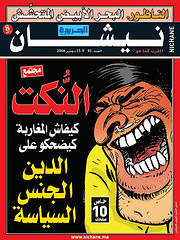
In a departure from the diary-like entries that characterize this blog, this is about Moroccan society, or the censorship therein. Two weekly magazines have recently been brought to their knees by the combined blows of an executive authority bent on self-preservation and a judiciary doing the former’s bidding. As described by Jane Kramer in last October’s New Yorker article entitled “The Crusader”, Le Journal Hebdomadaire’s editor-in-chief Aboubakr Jamaï has been engaged in an ongoing critique of the monarchy for a decade. In the last month, court functionaries have twice demanded payment of 3 million dirhams (≅US$350,000) following a 2005 court decision holding the magazine liable for defamation. The decision stems from Le Journal’s suggestion that a study conducted by the Centre européen de recherche, d’analyse et de conseil en matière stratégique (ESISC) on a question related to Morocco’s claims over the Western Sahara, were
Meanwhile, on January 15, an editor and a journalist for an Arabic-language weekly, Nichane, were both found guilty of publishing material attacking Islam, the king, and morals in the form of jokes that Moroccans tell about…religion, sex and politics (everything but territorial sovereignty, it seems). The punishment handed down by the court consists of three years’ suspended sentence for both defendants, a 80,000 dirham (US$9300) fine, and a 2 month ban on publishing.
The Nichane affaire has gotten much more attention than the “Moniquet Affaire” (so-named after the Belgian director of ESISC who filed suit, in Morocco, against Le Journal). Both publications are, however, representative victims of the different reactions taken by a monarchy on the defensive. As Jamaï pointed out in one of his final editorials, demand for payment came shortly after Le Journal published a cover story asking:
The Nichane affair, as with Le Journal, seems related to the executive authority’s determination to eliminate it’s adversaries, only in a less direct manner. After the offending issue was published on December 9, an Islamist website posted a complaint, followed by demonstrations in Gulf countries which, culminating in student protests outside a university in Kenitra, led the Prime Minister to ban the publication, an act that exceeded even the wishes of the protesting students, and was done on questionable legal ground. A month later, the decision was handed down.
In the case of Nichane, the government appears to be making an effort to outmaneuver Islamists in a parliamentary election year. The largest opposition party in the lower house, the Parti de la Justice et du Développement (PJD), is Islamist. Based on public polls (by an American group associated with the Republican Party, interestingly enough), the PJD is considered capable of winning an outright majority if elections were to reflect public opinion. The king’s advisors have already held meetings with the majority parties (a conglomeration of groups representing everyone from post-cold war no-longer-really-communists to rich men who create a party around themselves) on how to block the PJD’s ascent, and punishing a publication associated with secularists fits easily within the blueprint.
Thus, one act is taken to stem criticism of the monarchy, another to stem the popularity of the opposition Islamists. None of this, it should be noted, is all that new, and in this sense I am writing about myself after all. Le Journal notes a dozen court decisions over the last several years that have punished Moroccan journalists with sizeable fines and jail time, including one journalist banned from the profession for life for venturing into the debate on the Western Sahara on the “wrong” side. In light of this consistent intimidation of journalists, my reaction reflects, more than anything, the shocked sensibilities of a Western visitor. The fact that I read and value Le Journal and TelQuel means that I have followed these developments and felt, suddenly, effected by them. An Arabic weekly in Oujda could publish an interview with an Islamist leader and subsequently get banned – as has happened – and I would know of it only as a passing news item.
Nichane is published by the same editors who publish TelQuel, another francophone weekly whose chief editor, Ahmed Benchemsi, spoke at Al Akhawayn last semester. When I asked Mr. Benchemsi about Kramer’s article, he admitted that Jamaï was a crusader in a way that Benchemsi’s magazine is not, yet I enjoy reading them both. TelQuel is critical and entertaining in a way that links it to the interests of a younger generation (hence, Benchemsi’s appearance at Al Akhawayn). Almost every week, there is an article on changing sexual behaviors (internet dating, sexual harassment in public). A recent issue exemplified the magazine’s editorial priorities - topical social problem, Islamist threat, changing sexual mores – when the cover simultaneously addressed cold-related deaths in a rural area, the ailing leader of Morocco’s largest Islamist movement, and the booming market for condoms in Morocco.
Le Journal, by contrast, devotes more attention to uncovering financial and commercial corruption when not otherwise bluntly attacking the regime and its method of governance. My favorite issue to date, and what may well have precipitated the functionaries' second demand for payment, was a resplendently negative year-end special that identified
Interestingly, the language in both of these francophone publications used to describe this censorship evokes progress: that these are acts contributing to a regression away from democracy, etc. As I mentioned last week, progress is not so linear, but it certainly feels as though regression is.
